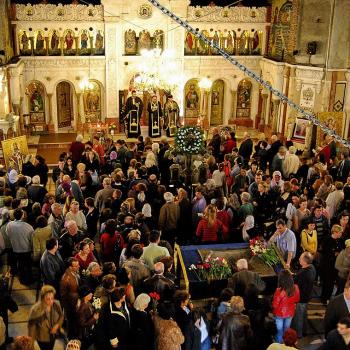
Paul Knitter, in his dialogue with Masao Abe (a famous Japanese Buddhist professor in religious studies involved with inter-religious dialogue), once raised the question of justice and its relationship to Buddhist meditational practices. To Knitter it seemed that the Buddhist emphasis was on meditation over justice, so that only through sitting down and realizing the true self, the world could be changed, which was the reverse of what he thought was necessary:
The second issue I would like to discuss with you might be summarized in the overly simplified statement: ‘You cannot sit unless you change the world.’ By that I mean the Christian insight – as formulated by liberation theologians – that we cannot taste the fruits of meditation or prayer, we cannot experience the Ultimate or the Formless Self, unless we are first, or at the same time, acting to transform the world. Meditation will not work unless it is preceded/ accompanied by action for social transformation. We cannot realize our Formless Self in the meditation hall unless we are also realizing it in actions for justice. [1]
When one reads Buddhist literature, though there is a sense that ethical foundations are established and promoted through them, it often seems that right action is best established in meditation itself. The way some Buddhist practitioners write, good intentions in meditation are seen as to be as beneficial (or even more beneficial) than physical actions themselves (because intentions, even in such physical activity, contain a significant portion of the karmic value of the act, and often other aspects of the physical act can undermine the intentions).
Abe, in part, agreed with Knitter; he acknowledged that there is an emphasis on meditation. “In Buddhism, the emphasis is on first knowing, on enlightenment, on sitting, which, then, will embrace acting. “[2] But he thought that Knitter established a false duality between meditation and action. The two go together. Meditation without right action goes astray, because it divides thought from deed. Right action and meditation should not be seen as distinct from each other, but connected with each other, so whatever one does, one can and should do so with a meditative spirit, opening oneself up to the insight to the True Self – or God. Thus, Abe explained, we should expect Christians to agree: acting for and out of justice must not be separated from prayer, nor prayer from such action; they go hand in hand, and abstracting one from the other ends of dismantling both of them. “In the ontological dimension, that is, the most profound existential dimension, both in Buddhism and in Christianity, meditation and practice, prayer and action are not two, but one.”[3] Without the higher awareness realized in and through meditation and prayer, our actions do not have the ontological and ethical foundation needed for them to be effective:
If social justice movements – peace, human rights, and the other reform movements – are pursued exclusively from a political and social dimension without a basis in a deeply realized true Self or in God-experience, such approaches may not yield adequate solutions. To be precise, the ground and condition, the source and occasion, must always be combined, such that in the depths of human existence the ground of the self, the ground of the world, and the ground of history are inseparably interconnected with one another. Thus we must realize that we are always standing and working at the very mode intersecting these dimensions of self, world, and history.[4]
This, then, Abe said, is why Buddhism in general prioritizes meditation and realization of the True Self, or the experience of God, over simple action; it is not because actions are unnecessary or unrelated to meditation and prayer, but rather, without understanding of the true ground of being, we will be blindly going forward in our actions:
Rather, I mean that the clarification of the self, that is, the awakening to the True Self, is necessary as the existential or ontological ground for our social movement. Without awakening to the True Self as the existential ground, we cannot establish world peace in the true sense. [5]
Abe, likewise, pointed out that although sitting meditation is a basic form of meditation, it is not the only way meditation can be practiced. Meditation does not have to be passive, but it can be active, such as seen in the type of meditation called walking meditation. Once this is understood, then all our actions can be and should be connected with a meditative spirit.
This discussion is important, and points out why, when some tragedy strikes, Christians cannot simply rely upon “thoughts and prayers” as their only response to the tragedy, while, on the other hand, people should not dismiss “thoughts and prayers” as being a part of an authentic Christian response to tragedy. Thoughts and prayers are invaluable. It is important to show solidarity and compassion with those suffering. But as faith without works is dead, so thoughts and prayers which are not realized in action end up being dead, for such thoughts and prayers are incomplete.
Our life is meant to be a life of prayer. We are to be praying without ceasing, but such unceasing prayer is not manifested by us by simply sitting down and saying our prayers to God, hoping for God’s grace to produce a miracle, but rather, by our actions, hoping to mediate the grace our contact with God brings to us to those in need. True prayer must never be seen to be disconnected from action: to do so is to follow through with the error of the quietists. Thoughts and prayers, when they are properlt offered by us (instead of being given as some sort of external show), will never be disconnected from action.
This is why a person who honestly offers their thoughts and prays for someone suffering with tragedy will seek to do what they can to help those in need. Of course, each person will act differently based upon their ability and the circumstances and relationship they have with the persons needing prayer. Not everyone can offer the same kind of help. Sometimes it will be direct assistance. Sometimes it will be just a show of compassion. Sometimes, it will lead someone to look to the cause of the problem and find a way to make sure the problem does not come up again. What is important is that if someone truly cares, and offers thoughts and prayers, they should do what they can to help, and not hinder or continue to hurt, those in need.
In this fashion, to say that thoughts and prayers must be realized through action is not to say everyone will do the same action, but, on the other hand, if someone says they offer thoughts and prayers but act contrary to and impede the resolution to the tragedy, then it is clear, their thoughts and prayers are worse than worthless, because they are offered in vain.
We must realize that a life of prayer and meditation will be a life of action. Even those who go out into the wilderness to become hermits do more than sit around praying every day. If they do not, they would not live for long, because their earthly needs (food, shelter, clothing) would not be met. Often, their actions are to create a kind of earthly paradise around themselves, to start building a small corner of peace which they – and those who come near them – can experience; and because of the way the world is interconnected, improving their small, local space will help in improving the world as a whole. This is why St. Seraphim of Sarov was able to say if we want to save the world, we must first work on ourselves; but on the other hand, working on ourselves always means refining our actions, doing what is necessary according to the circumstances we find ourselves in. Despite the differences between a hermit and the non-hermit, the call is the same, the call to realize one’s authentic self in union with right action, just the kind of action which is expected will differ according to the various walks of life one finds themselves in.
Paul Knitter and Masao Abe, in their discussion on Buddhism and the relationship between meditation and action, led Abe to point out the truth which Buddhism wants us to understand. Action and meditation, action and prayer, must not be divided from each other, but rather, seen as united; when we divide them from each other, they both suffer. For, as Abe pointed out, without realization that comes from prayer and meditation, our actions will be inauthentic: “On the other hand, however important the action to transform the world may be, if it is not based on God-experience or awakening to True Self, it is also inauthentic.” [6] But on the other hand, then, the reverse is true. Without action, without engagement with the world, doing what is necessary for justice and charity, our prayer and meditation will end up being inauthentic. The two go hand in hand. The more we open ourselves in meditation and prayer to the ontological ground of being, the better our actions can be; the better our action, the more we open ourselves to that ground of being. The goal is to realize our True Self in God; when we do so, we will find our thoughts and actions are united as one, reflecting upon the similar and greater simple unity of God’s actions with his thoughts and essence.
[1] Masao Abe, “Spirituality and Liberation: A Buddhist-Christian Conversation (With Paul Knitter),” in Buddhism and Interfaith Dialogue. Ed. Steven Heine (Honolulu: University of Hawaii Press, 1995), 233 (Paul Knitter).
[2] Masao Abe, “Spirituality and Liberation: A Buddhist-Christian Conversation (With Paul Knitter),” 236 (Masao Abe).
[3] Masao Abe, “Spirituality and Liberation: A Buddhist-Christian Conversation (With Paul Knitter),” 241(Masao Abe).
[4] Masao Abe, “Ethics and Social Responsibility in Buddhism” in Zen and the Modern World. Ed. Steven Heine (Honolulu: University of Hawaii Press, 2003), 35.
[5] Masao Abe, “Spirituality and Liberation: A Buddhist-Christian Conversation (With Paul Knitter),” 237 (Masao Abe).
[6] Masao Abe, “Spirituality and Liberation: A Buddhist-Christian Conversation (With Paul Knitter),” 240 (Masao Abe).
Stay in touch! Like A Little Bit of Nothing on Facebook.
If you liked what you read, please consider sharing it with your friends and family!













